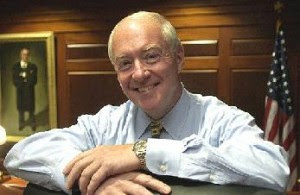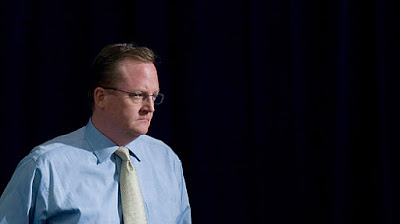0 comment Tuesday, July 8, 2014 | admin
 Hooray for Henry Hudson, the federal judge who today ruled that Obamacare's individual mandate is unconstitutional.
Hooray for Henry Hudson, the federal judge who today ruled that Obamacare's individual mandate is unconstitutional.Specifically, he said Congress's power under the Commerce Clause, while broad, is not unlimited. Congress cannot force people to buy a product in interstate commerce.
Congress can certainly regulate participants in interstate commerce. But it can't force people who do absolutely nothing into the stream of interstate commerce.
The Administration had a frightful argument to support the mandate. Here's the essence of it:
a) Every individual in the country will need health insurance at some time point in their life.
b) If every individual doesn't pay for health insurance, the health insurance market will fail. It will be unsustainable because the people who do pay for insurance will be forced to float those who don't, in the form of higher premiums.
c) Therefore, Congress can make everyone buy health insurance. The end.
Huh? That a market might fail means government intervention to force people to buy its products is, ergo, constitutional?
Put the Administration's argument into other contexts.
Everyone in our country will need housing at some point. Some people will skip out on their rent, or mortgage, and the folks who stay and pay will ultimately pay more, to cover the landlord's or bank's losses. Therefore, Congress can make everyone rent an apartment. Or buy a house.
What about food? Transportation?
Congress's power is not plenary. Its power is limited and Obamacare goes beyond the outer limits of Congress's power under the commerce clause, said our hero Hudson.
But hold on, said Secretary Sebelius. This mandate is constitutional under the "Necessary and Proper" clause. Nope, said the Court. The "Necessary and Proper" clause isn't an independent grant of power. It just lets Congress pass laws to effectuate and implement Constitutional laws.
 But wait, try this one on, Sebelius countered. The individual mandate is really a tax. And Congress can tax anything!
But wait, try this one on, Sebelius countered. The individual mandate is really a tax. And Congress can tax anything!The judge was not buying. For one thing, about 500 million people in Congress and within the Administration said it was a penalty, not a tax. For another, it is indeed a penalty. And you can't penalize citizens for failing to comply with an unconstitutional law.
Judge Hudson did, however, decline to issue an injunction. He noted that his order granting declaratory relief to the Commonwealth of Virginia was the equivalent of an injunction because it dealt with the constitutionality of federal law. It was, he said, "sufficient to stay the hand of the Executive branch pending appeal."
 To that, Robert Gibbs said, essentially, "In your eye!" Specifically, at today's press conference, he said,
To that, Robert Gibbs said, essentially, "In your eye!" Specifically, at today's press conference, he said,I think it is safe to say that because there are several other cases in the pipeline and because of -- again, you�ve got disparate court rulings 115 miles away -- that the bill will continue to have its day in court.
I do think it is important that even this judge ruled that the bill continues to move forward in terms of its implementation.
Did not!
So it will be up the U.S. Supreme Court to decide whether Congress stayed within its outer limits, or instead reconstituted another form of government: the one in England that we fled.
Labels: Aca, Barack Obama, Commerce Clause, Congress, Health Insurance Mandate, Judge Henry Hudson, Obamacare, Opinion Simplified, Outer Limits, Penalty, Plenary Power, Robert Gibbs, Tax, Unconstitutional
